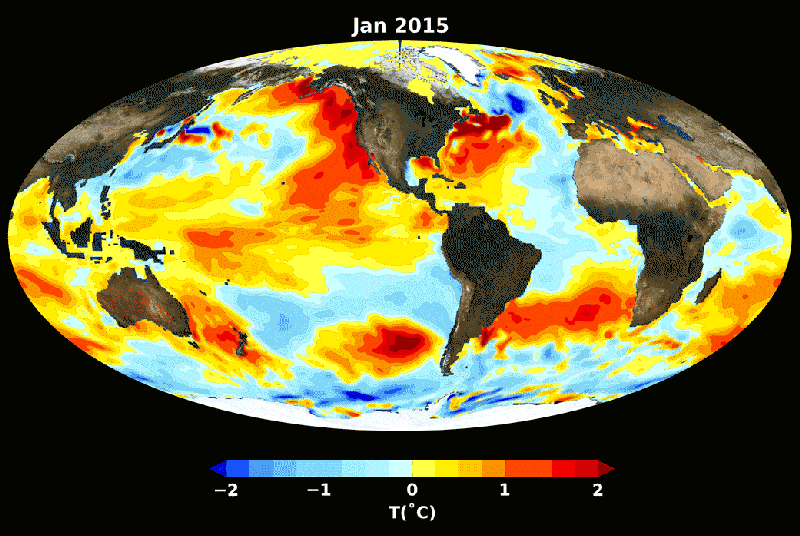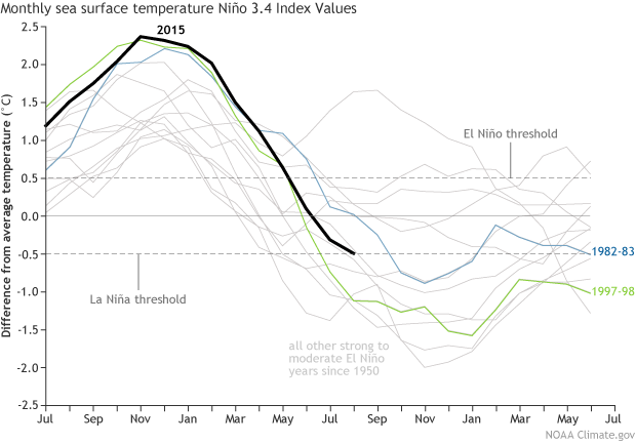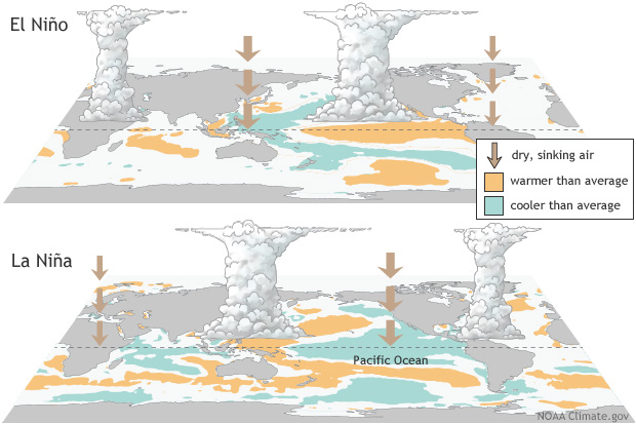Sea surface temperature patterns of the 2015 El Niño
don’t show any signs of an impending La Niña this year.
Image: NASA
From Gizmodo by Maddie Stone
After promising biblical rains and instead giving California crabs, El Niño passed away quietly last spring. But while early data suggested La Niña would rise to fill the chasm El Niño’s departure had left in our meteorological newsfeeds, NOAA is now starting to think La Niña might not happen at all.
As the spring wore on, our confidence in the anti-El Niño climate pattern grew stronger, bolstered by the expansion of a telltale, cold water undercurrent in the equatorial Pacific.
When that cold water mass started to breach the surface last May, ending the reign of El Niño’s hot blob once and for all, climatologists forecasted a 75 percent chance La Niña would be here by the end of the year.
Monthly sea surface temperature anomalies in the Niño 3.4 region of the
tropical Pacific, with El Nino and La Nina threashold conditions
indicated by dashed lines.
Image: Climate.gov
But late last week, NOAA’s Climate Prediction Center poured some cold water on our hope that lots and lots of cold water would spread across the Pacific’s midsection, perhaps even making a temporary dent in our global, carbon emissions-fueled heat wave.
Last week, the La Niña watch was officially taken down. Forecasters are now placing their bets on ENSO-neutral conditions (aka, neither El Niño nor La Niña) persisting through the winter.
As a blog post by NOAA explains, we’re still measuring cooler-than-average temperatures across the so-called Niño 3.4 region of the tropical Pacific, which are considered typical for La Niña. But that temperature dip hasn’t been accompanied by the La Niña atmospheric response.
By this point, we should be seeing an amping up of the Walker circulation pattern, meaning cool air should be sinking more vigorously in the central and eastern Pacific as warm air rises more vigorously over the western Pacific.
El Niño and La Niña, the warm and cool phases of the El Niño-Southern
Oscillation, disrupt large-scale air movements in the tropics, impacting
weather patterns across the world.
Image: Climate.gov
“So far, there have only been some very weak indications of this intensification,” NOAA writes. And without these atmospheric acrobatics, the cool subsurface waters in the Niño 3.4 region are likely to fizzle out.
La Niña could still happen—it might just be a late bloomer.
But the probability that we’ll be welcoming a La Niña into the world this winter has been downgraded significantly to about 40 percent.
Despite having virtually tied the 1997-98 El Niño in terms of strength, our planetary party guest didn’t end California’s drought, although that may have been an unreasonable expectation. It sorta figures that El Niño’s alter ego would be a no-show.
Links :
- NASA : After strong El Niño, NASA sees return to normal
- Climate.gov : September 2016 ENSO update: Cooling our heels
- ClimateCentral : Is La Niña Here? Depends Who You Ask



No comments:
Post a Comment